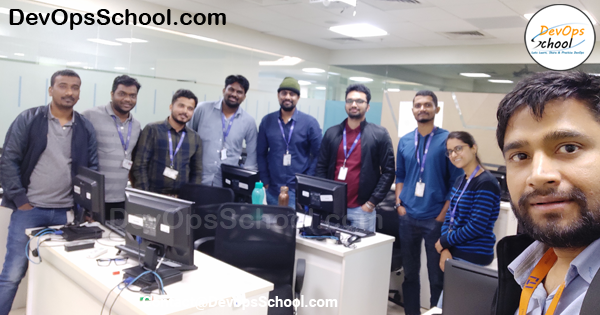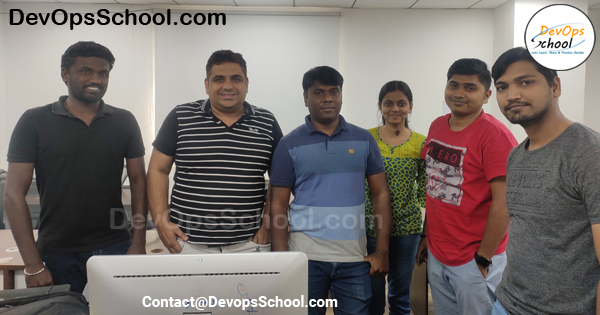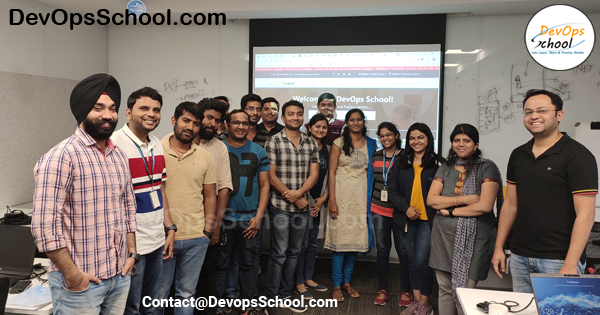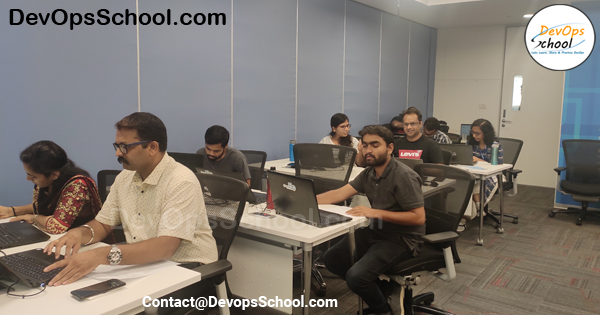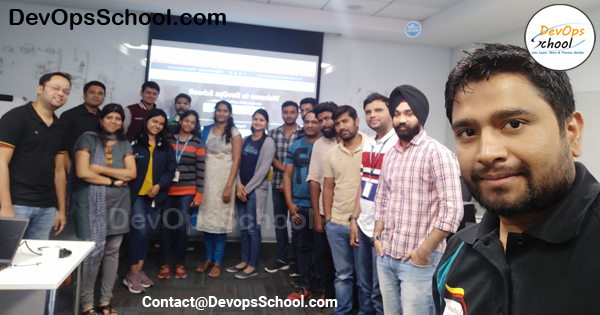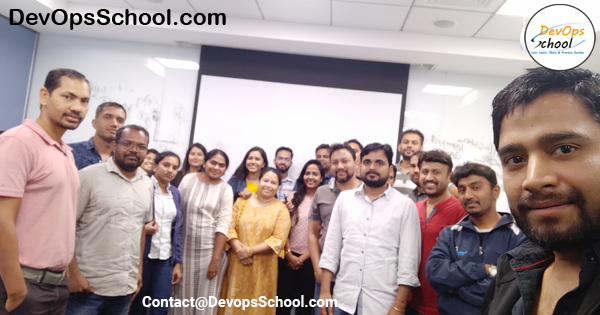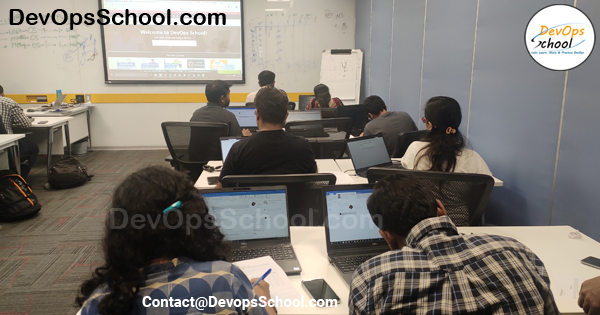Kubernetes CKA Training Course and Certification by Industry Expert Trainer
About This Course and Certification
The Kubernetes CKA (Certified Kubernetes Administrator) Training Course by Aiuniverse in collaboration with DevOpsSchool.com is designed to help IT professionals master the skills necessary to become a Certified Kubernetes Administrator. This hands-on course is delivered by Rajesh Kumar, an industry-leading DevOps and Cloud expert with over 15 years of experience in helping organizations adopt cloud-native technologies.
Participants will get in-depth knowledge of Kubernetes’ architecture, key components, and functionalities, and they will be guided through every step of deploying, managing, and securing Kubernetes clusters. After completing this course, students will be ready to pass the Certified Kubernetes Administrator (CKA) certification exam, issued by the Cloud Native Computing Foundation (CNCF).
What is Kubernetes?
Kubernetes is a powerful open-source platform used to automate the deployment, scaling, and management of containerized applications. Developed initially by Google, Kubernetes is now managed by the Cloud Native Computing Foundation (CNCF) and has become the de-facto standard for orchestrating containers in both on-premise and cloud environments.
Key Kubernetes tools and components covered in this course:
- kubectl: The command-line tool to interact with the Kubernetes cluster.
- Containers and Docker: The foundation of modern software development and Kubernetes.
- Pods: The smallest deployable unit in Kubernetes.
- Kubelet: Manages containerized applications and ensures that containers are running properly.
- Helm: A package manager for Kubernetes applications.
- Namespaces: Logical divisions to manage complex Kubernetes environments.
- Ingress Controllers: To manage external access to services within a cluster.
- Kube Proxy: Networking proxy that maintains network rules across nodes.
Why Kubernetes is Important?
Kubernetes is central to modern IT infrastructures because it automates many manual processes involved in deploying and managing containerized applications. Key reasons why Kubernetes is crucial:
- Cloud Agnostic: Kubernetes can run on any infrastructure, be it on-premise, in the cloud, or hybrid setups, offering immense flexibility.
- Scalability: Kubernetes makes it easy to scale applications up or down based on real-time demand with minimal human intervention.
- Efficient Resource Management: Kubernetes automatically optimizes resources by scheduling workloads onto the most appropriate hardware.
- Resilience: Kubernetes offers automatic recovery from application or node failures, ensuring high availability.
- Continuous Delivery/Deployment (CI/CD): It integrates seamlessly with DevOps pipelines, making it essential for companies adopting cloud-native architectures.
Course Features
- Expert Trainer: Learn from Rajesh Kumar, a recognized DevOps and Kubernetes expert with extensive industry experience.
- Certification-Focused: Prepares students to pass the Certified Kubernetes Administrator (CKA) exam from the CNCF.
- Hands-On Labs: The course offers extensive hands-on labs where participants will deploy and manage Kubernetes clusters in real-world scenarios.
- Interactive Learning: Live, instructor-led sessions with opportunities to ask questions, discuss use cases, and solve real-world challenges.
- Lifetime Access: Students get lifetime access to training materials, including recorded sessions, presentations, and lab exercises.
- Mock Exams: Practice exams to simulate the real CKA exam experience.
- Certificate of Completion: All participants receive a certificate upon completing the course.
Training Objectives
The course aims to equip participants with:
- Kubernetes Architecture: Understanding components such as Pods, Nodes, Services, ConfigMaps, and Persistent Volumes.
- Cluster Management: Skills to set up, configure, and manage a production-ready Kubernetes cluster.
- Security Best Practices: Implementing Role-Based Access Control (RBAC) and managing sensitive data.
- Application Deployment: Deploying, monitoring, and scaling containerized applications using Kubernetes.
- Storage and Networking: Managing persistent storage, network policies, and Ingress controllers.
- Troubleshooting: Identifying and resolving issues in Kubernetes clusters.
- CKA Certification Preparation: Passing the CKA exam.
Target Audience
This training program is tailored for the following professionals:
- DevOps Engineers: Those who want to automate infrastructure using Kubernetes.
- System Administrators: Looking to modernize their skillset with Kubernetes knowledge.
- Software Developers: Working with containerized applications and microservices.
- Cloud Architects: Designing scalable cloud-native infrastructure using Kubernetes.
- IT Professionals: Transitioning to containerized or cloud-based environments.
Prerequisites: Basic knowledge of Linux, containers, and Docker is recommended, but no prior Kubernetes experience is required.
Training Methodology
This training follows a highly interactive and hands-on approach:
- Instructor-Led Lectures: Real-time interactive sessions to explain core concepts.
- Hands-On Labs: Extensive labs to practice Kubernetes deployment, scaling, and monitoring in a real-world environment.
- Case Studies: Analysis of real-world implementations of Kubernetes in enterprise settings.
- Group Discussions: Sessions to clarify doubts and share experiences across diverse industries.
- Quizzes and Assignments: To reinforce the key learning outcomes.
Training Materials
Participants will have access to a range of study and learning materials:
- Lecture Slides: Detailed presentations covering all aspects of Kubernetes.
- Lab Guides: Step-by-step instructions for hands-on labs.
- Recorded Sessions: Full access to the recorded video lectures for lifetime review.
- Mock Exams: CKA-style practice tests to prepare for certification.
- Reference Materials: Links to additional resources, Kubernetes documentation, and best practices.
Evaluation
The success of the training program will be evaluated through:
- Pre-Test and Post-Test: Assess knowledge before and after the course.
- Mock CKA Exam: Simulated CKA exam conditions to gauge readiness.
- Practical Assessments: Evaluate performance in hands-on labs.
- Participant Feedback: Collect participant feedback through surveys to assess course effectiveness and areas for improvement.
Continuing Education
After the course, participants can further enhance their knowledge:
- Kubernetes Documentation: Continued access to official Kubernetes resources.
- Advanced Kubernetes Courses: Specializations like Kubernetes Certified Application Developer (CKAD) or Certified Kubernetes Security Specialist (CKS).
- DevOpsSchool Webinars: Regular sessions on emerging technologies in the DevOps ecosystem.
- Community Support: Join Kubernetes community forums, user groups, and online discussions for continuous learning.
Certifications Program
Upon completing this training program, participants will be ready to take the Certified Kubernetes Administrator (CKA) exam, a globally recognized certification that validates their expertise in managing and operating Kubernetes clusters.
The CKA certification is a valuable credential for anyone looking to establish or advance their career in DevOps, Cloud, and Infrastructure Management.
Level of Training
The Kubernetes CKA Training spans from Fundamentals to Advanced Levels, making it suitable for beginners and experienced professionals alike. The course starts with basic concepts, such as containers and Kubernetes architecture, and gradually advances to complex topics like multi-cluster management, networking, and security.
Agenda (Day-wise)
Day 1:
- Introduction to Kubernetes and its architecture
- Understanding containers, pods, and clusters
- Setting up Kubernetes clusters using Minikube & kubeadm
Day 2:
- Managing workloads: Pods, Deployments, ReplicaSets
- Networking: Services, DNS, and Ingress Controllers
- Working with ConfigMaps and Secrets
Day 3:
- Persistent storage and volumes
- Scaling applications: Horizontal Pod Autoscaler
- Resource quotas and limits
Day 4:
- Monitoring and troubleshooting Kubernetes clusters
- Helm: Package management for Kubernetes
- Security in Kubernetes: RBAC, network policies, and managing secrets
Day 5:
- Advanced topics: Multi-cluster management and Federation
- CKA Exam preparation and mock exam
- Hands-on lab sessions and review
Lab Setup
For optimal hands-on experience, participants are recommended to have the following setup:
- Linux VM or Cloud Instances (AWS, Azure, GCP) with at least:
- 4 vCPUs and 8 GB RAM
- Docker and Kubernetes installed (using Minikube or kubeadm).
- Install kubectl for command-line interaction with Kubernetes clusters.
- Helm installation for application management.
Detailed setup instructions will be provided before the course begins.
Trainer: Rajesh Kumar
Rajesh Kumar, a highly respected DevOps and Kubernetes trainer, will lead this course. Rajesh has more than 15 years of experience in cloud-native development, DevOps automation, and CI/CD pipeline management. He has trained thousands of professionals and works with leading enterprises to implement DevOps best practices.
For more information, visit www.rajeshkumar.xyz.
FAQs
- What are the prerequisites for this course?
Basic understanding of Linux and containers (Docker) is helpful but not mandatory. - Do I get lifetime access to the course materials?
Yes, all participants receive lifetime access to course materials and recorded sessions. - Is this course aligned with the Certified Kubernetes Administrator (CKA) exam?
Absolutely. This course is designed to cover all the topics required for the CKA certification exam. - Will I have hands-on lab sessions?
Yes, the course includes practical, real-world hands-on lab sessions to deploy and manage Kubernetes clusters. - What if I miss a class?
All live sessions are recorded, and you will have access to the recordings to catch up on missed content. - Is there a practice exam?
Yes, the course includes mock CKA exams to help you assess your readiness for certification. - Will I receive a certificate after the course?
Yes, you will receive a course completion certificate from Aiuniverse and DevOpsSchool. - How will this course help me in my career?
Kubernetes expertise is highly sought after in cloud computing, DevOps, and IT management roles. Achieving the CKA certification will enhance your career opportunities. - Is Kubernetes only for cloud environments?
No, Kubernetes can be used in on-premise, cloud, or hybrid environments, making it versatile for many types of organizations. - How is Kubernetes different from Docker?
Docker is for creating containers, while Kubernetes is for orchestrating, managing, and scaling those containers in production environments.
Certification
- Certification always plays vital role as it leads you towards a dedicated knowledge and skillsets.
- It provides you the ability to stand out of others.
- It gives you an edge during an interview by impressing the interviewer through your certification.
- DevOpsSchool helps you getting this certificate by making you worth to have it.
- DevOpsSchool gives you a completion certificate after successfully completion your training. it will be as a proof of your ability of knowledge and skills.
- The training will be given by industry recognized expert trainers who will make you an expert professional to hold this certificate.
- This certificate belongs to only DevOpsSchool, not to any other colleges, institute or company.
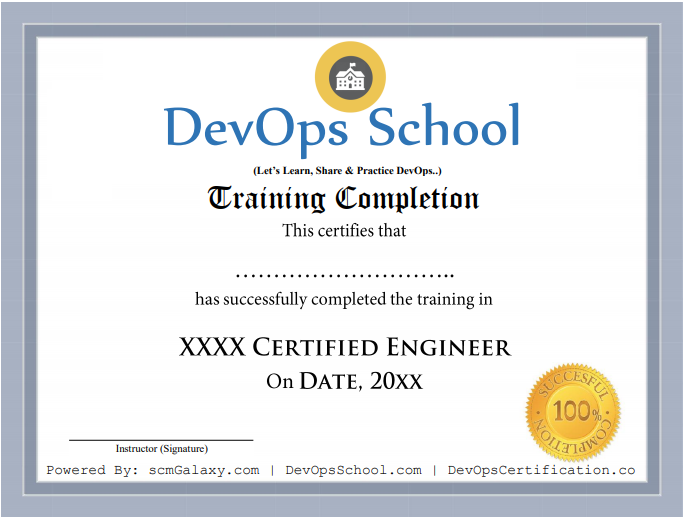
Reviews
By having an excellent journey with 8000+ participants from different countries we have got excellent reviews that helps us stand out of other institutes and being proud. We proudly can say we have helped so many individuals and working professionals to build their career. Here are some of the reviews that we have got from our participants who are happy by being a part of DevOpsSchool.
Videos
Projects
During this training you will get a real-time based project to work on, which will help you to implement your learnings and also it will boost your knowledge and skills. With important tools and platforms you will have real-world experience where we help you to visualize a real development environment, testing environment and production environments.
FAQs
1. Will I get technical support after completion of training?
- Yes, Its free of cost for life time. We will give you can access of our Google drive where you can drop you query and our trainers will respond you back.
2. Why should I learn Kubernetes course online instead of offline?
- First this is the best option to keep you and your instructor safe in this dangerous pendamic. As well as the environment and benefits what you will get in offline classes same we will provide you in online classes. We will make your experience much better and comfortable than offline classes. That’s why we provide live and instructor-led online classes where you can interact your instructor to clear your doubts.
3. How long will it take to complete the course?
- It will take approx 15 Hrs to fully complete the course.
4. Will I get any placements after the training?
- Well we don’t provide any placements as of now but we can provide you a interview kit to help you out.
5. What are the pre-requisies to learn Kubernetes?
- Have basic mathematic knowledge
- Want to learn more about Kubernetes Intermediate
6. Can a non technical person learn Kubernetes?
- Yes, but it will be very hard to learn because here the technical words and platforms will be used that he will be not aware of so in my recommendation you shouldn’t try but if still if you want to then yoou should be very concentrated and honest with you as you have to work hard.
7. Do you have online classes or offline classes?
- As of now online classes but he it is a group of people requirement then we can have discussion about offline classes.
8. Will I get the job after completing this course?
- Yes, you will be fully capable to perform any task given to you by your domain senior or manager. As you will be certified engineer who will have all the required skills and knowledge to perform any task.
9. Which kind of certification will DevOpsSchool provide?
- It’s a completion certificate. It will show that you have successfully completed the training and have the right skills and knowledge to perform the task assigned by your company.
10. How to start a Kubernetes career?
- You can go for self learning materials like Pdf, Slides, youtube videos but there are one more option that is our Kubernetes program. It’s our Kubernetes certifed program that will teach you from basic to make you able to understand and perform a Kubernetes engineer tasks.
11. Who will be my trainer?
- As we have so many trainers its not possible to tell you quickly, as we have to go through their availability. But we can assure you you will get a best trainer as we have a group of best trainers who are very experienced and skillful trainers. They have 15+ IT working experience.
12. Can I get a demo session?
No we don’t provide any demo class but instead of that we can provide you a class recordings so you can decide.
13. Do we have classroom training?
Yes, Classroom training is available in Bangalore, Hyderabad, Chennai and Delhi location. Apart from these cities classroom session can be possible if the number of participants are 6 plus in that specific city.
14. How will I execute the Practicals?
All the Demo/Hands-on are to be executed by our trainers on DevOpsSchool’s AWS cloud. We will provide you the step-wise guide to set up the LAB which will be used for doing the hands-on exercises, assignments, etc. Participants can practice by setting up the instances in AWS FREE tier account or they can use Virtual Machines (VMs) for practicals.
15. What if I miss any class?
In case if you miss the class then there are two ways to get to know what topics has been covered, i.e 1st- We will share the class recordings, notes etc to you and 2nd – you can attend any other session under 3 months of time period.
16. What is course fees?
- Rs 19,999
17. What are the system requirements for this course?
- The system requirements include Windows / Mac / Linux PC, Minimum 2GB RAM and 20 GB HDD Storage with Windows/CentOS/Redhat/Ubuntu/Fedora.
18. What are the payment options?
- Google Pay/Phone pe/Paytm
- NEFT or IMPS from all leading Banks
- Debit card/Credit card
- Xoom and Paypal (For USD Payments)
- Through our website payment gateway
Our Gallery
